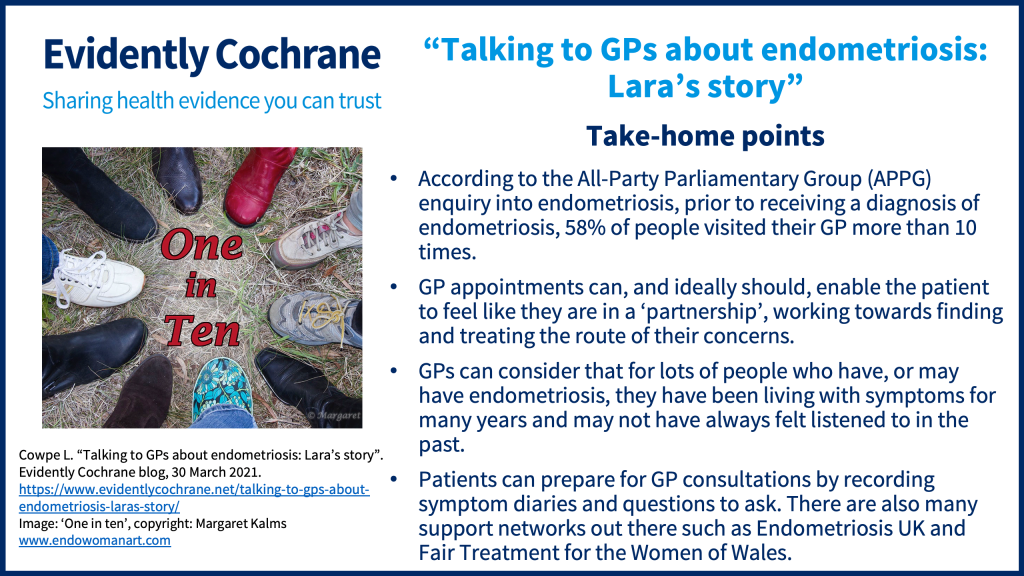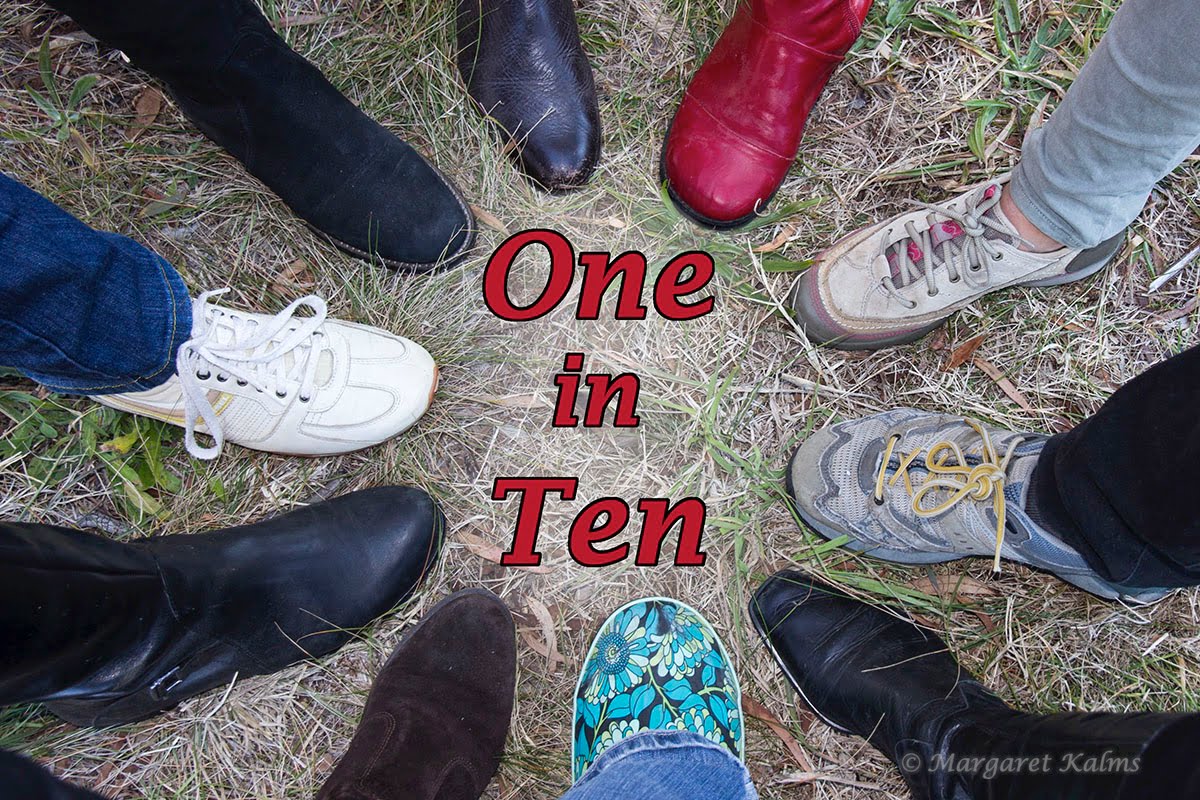In a blog for GPs and for people seeking help from their GPs (especially those who have or may have endometriosis), Lara Cowpe reflects upon her experiences with GPs during her endometriosis journey.
This blog is the eighth in our #MyEndometriosisQuestion series running throughout March, with blogs about endometriosis and an invitation to ask your questions, which a panel of experts have been addressing throughout the month.
Featured image: ‘One in ten’ by Margaret Kalms* http://artofwoman.com.au
Page last checked 3 July 2023

Four years ago I booked a routine smear test with my GP surgery. I asked the receptionist for a double appointment and, squirming as I did so, I explained it was because I find them very painful and therefore need more time so it is not rushed. I asked for the smear to be performed by a doctor and I also asked them to check that they had the smallest (aka ‘virgin’) speculum in stock. On the day, Dr X introduced herself and I asked ‘please can I have the smallest speculum?’ and ‘I have pain down below so can we do this slowly.’ Dr X was very gentle and calm but it did no good, the smear was almost unbearable. The only reason I go through with them is because it checks for cancer!
Afterwards, Dr X kindly asked me to get dressed and take a seat by her desk. Dr X said to me “I need to ask you, do you always find smears this uncomfortable?” “Yes, but doesn’t everyone?” I replied. Dr X paused, “hmmm. Not necessarily. I also want to ask you a personal question, do you have pain during sex?”
I observed she seemed concerned for me and so I took a chance and decided to open up a little. Yes, I told her, I do have pain with sex but given that we aren’t planning on having children yet we are not too concerned right now. But… isn’t it normal to have pain during sex if you don’t do it often?
Dr X explained to me that day that she didn’t think my symptoms were ‘normal’ and that there may be something else going on. She referred me to Gynaecology.
Over the next three years I was seen by a gynaecologist who is a specialist in endometriosis. He took a full menstrual and medical history and explained that a laparoscopy would rule out certain things including endometriosis but due to pain during intercourse being my main concern, we discussed that this could be caused by other things such as pelvic floor dysfunction. I was keen to explore non-surgical options first and so we agreed that he would refer me to women’s health physiotherapy. Following 18 months of physiotherapy my symptoms improved and I learnt that my pelvic floor muscles were over-active and I could have something called vulvodynia. During this time we were able to start trying for a baby but by autumn 2019 I had had two miscarriages. No one seemed entirely sure what the overall problem was and looking back I had a feeling we hadn’t got to the bottom of what was going on.
The partnership between patient and GP
Dr Y was the GP I saw following miscarriage number two in September 2019. I was seeing a GP because a lump had appeared in my groin and wasn’t going away. Dr Y sat and listened to my explanation. He also told me he had reviewed my notes on the clinical portal and could see the entry from the Early Pregnancy Unit. He said he was sorry for my loss and asked me how I was doing. Dr Y was empathetic and offered to write me a sick note for work if I felt I needed time off but I said I was ok and thanked him for the offer.
Dr Y examined me thoroughly, took note of the history of my complaint and surmised that it could be a lymph node and that he could refer me for some blood tests. I requested an ultrasound. Dr Y wanted to wait for the blood test results first… I agreed. After a normal result I was referred for urgent ultrasound. After a repeat ultrasound one month after the first one the radiologist asked me if he could do a biopsy. Suspected diagnosis… thrombophlebitis… lymphoma… or endometriosis. I know which I would rather it be – and the one I convinced myself it was.
In December 2019 I had a call from Dr Y with the results. He told me it was good news: I didn’t have cancer. However, the results showed endometriosis. I was elated not to have cancer (again – that is another story!) but I was also slightly devastated to have a chronicA health condition marked by long duration, by frequent recurrence over a long time, and often by slowly progressing seriousness. For example, rheumatoid arthritis. condition that has no cure. How can a person functioning so well, have something so severe happening within their body? This seemed to go against stereotypical images of illness. Dr Y was very sympathetic and gave me the name of another GP in the practice, one who has a special interest in women’s health (Dr Z).
At the start of 2020 I was placed on the NHS waiting list for explorative laparoscopy to determine the extent of my endometriosis. The surgery would involve a gynaecologist and colorectal surgeon because, by this point (four years on from my initial referral), other symptoms had started to rear their heads; miscarriage (now at three), bowel urgency, bowel pain, stomach pain during periods worsening, pelvic pain and the list goes on. Due to delays in NHS surgical waiting lists as a result of COVID-19, I had my explorative laparoscopy privately towards the end of 2020 which showed severe endometriosis involving parts of my small and large bowel, ovaries, peritoneum, and the space between my bladder and uterus, and uterus and bowel. At the time of this blog being published I am eight weeks post excision surgery just four months after my initial operation.
Dr Z has been incredible following my most recent laparoscopic excision surgery. She has supported me while being off work, and with my return to work, and discussed plans for fertility services in the future and how, together, we could navigate the referral process. This is important to me because although we know we need to try naturally for six months post operation, the thought of trying, not succeeding and only then being referred would be detrimental to my mental health. Dr Z responds to messages I leave with the surgery promptly and I continue to feel fully involved in my care.
What I want GPs to know
- Acknowledging my ‘not so normal’ reaction to a routine smear examination and asking further questions tactfully but ‘to the point’ enabled me to disclose something so very personal but that ultimately began a sequence of events that changed my life. It is important that GPs take a holistic approach to explore menstrual / pelvic symptoms to try and find the route cause.
- I had researched and discussed with healthcare colleagues what investigations may be needed. Allowing me to challenge and ask questions, to discuss with me the investigations I wanted and felt I needed, and what my options were, in a professional manner, made me feel a partner in my healthcare decisions.
- My GP’s efficiency enabled investigations and diagnosis to happen in a short space of time from presentation, which I appreciated due to my medical history of cancer but also because one just wants to know what is wrong. Once you know what is wrong, you can begin to understand it and move forward out of what I call ‘Limbo Land’ – the place a patient visits while waiting for investigations/ test results which is full of uncertainty, anxiety and loneliness.
- It was reassuring when the GPs told me they had read my notes, checked the clinical portal and demonstrated in their discussion with me that they were up to date with my medical history.
- It made a difference to me that my GP so sensitively discussed my miscarriage with me, when they could have glossed over it. This was the first and only time a healthcare professional attempted to discuss ‘how I really was’ after a miscarriage.
- I appreciated it when my GP acknowledged a colleague who they felt may be better for me to seek advice and support from going forward.
- It mattered to me that a GP was honest about being unsure how a certain referral system worked and we talked about how we would, together, figure out the way forward.
- The GPs I saw enabled me to feel involved in my decisions and truly made me feel, in their manner and approach, that they were listening to my thoughts and opinions. I am sure I will be having have many more conversations with GPs over the years about my chronic/ long-term condition and I feel very comfortable in doing this because of my past experience with the GPs mentioned above.
This is an example of how the relationship between GP (and indeed all healthcare professionals) and patient should be. A partnership. It would be naive of me to say that this is always the case, because it is not. To patients reading this, know that it can be this way. To GPs and healthcare professionals reading this, if this sounds like you – please know it is appreciated and keep doing what you are doing. If you can take something from this to your practice, please do.

Top tips for people preparing to visit their GP:
- take a symptom diary with you.
- write down a list of questions you want to ask.
- take notes during the consultation if you need to and ask the GP to clarify if you don’t understand something.
- the receptionist may ask the reason for your appointment, they are often required to do this. You do not need to give a reason but from my experience it does help you to be seen appropriately (you may be asking to see a particular GP) and promptly.
- if you are referred by a GP to a specialist you can check the referral status by ringing the GP practice to check when it was sent and also by ringing the health board/ trusts appointments team or department to check where the referral is in the system. For suspected endometriosis, consider asking to see someone with a specialism in this condition.
- if you are not happy with your consultation with your GP you could ask to see a different GP and/or liaise with the practice manager to try and address any concerns you may have.
- if you don’t feel you can wait for an appointment on the NHS to see a specialist then consider a private consultation – you can research consultants on the private hospital websites and some NHS websites also have consultant biographies too. Private hospitals may offer payment plans for treatmentSomething done with the aim of improving health or relieving suffering. For example, medicines, surgery, psychological and physical therapies, diet and exercise changes. too.
- Endometriosis UK have advice for visiting your doctor which includes a pain and symptom diary you can download.
Support for people with endometriosis
There is a vibrant online community of women with endometriosis, commonly known as #endosisters, who share knowledge and offer support, along with charities such as Endometriosis UK and grassroots organisations such as Fair Treatment for the Women of Wales.
Further information about endometriosis
- Cochrane Gynaecology and Fertility: Endometriosis Awareness Month
- Endometriosis UK
- The British Society for Gynaecological Endoscopy (BGSE) maintains a list of accredited endometriosis centres.
- Fertility Network UK
- The All-Party Parliamentary Group (APPG) on Endometriosis
- NICE Guideline on endometriosis: diagnosis and management
Listen to Lara’s story
Read the transcript: Lara- My Endometriosis – part 1
Read the transcript: Lara- My Endometriosis – part 2
Read the transcript: Lara- My Endometriosis – part 3
References and further reading (pdf)
Lara Cowpe has nothing to disclose.
*Images used with permission and cannot be reused without permission from the artist.
Join in the conversation on Twitter with @LaraCowpe @CochraneUK and @CochraneCGF or leave a comment on the blog.
Please note, we cannot give medical advice and do not publish comments that link to individual pages requesting donations or to commercial sites, or appear to endorse commercial products. We welcome diverse views and encourage discussion but we ask that comments are respectful and reserve the right to not publish any we consider offensive. Cochrane UK does not fact check – or endorse – readers’ comments, including any treatments mentioned.


